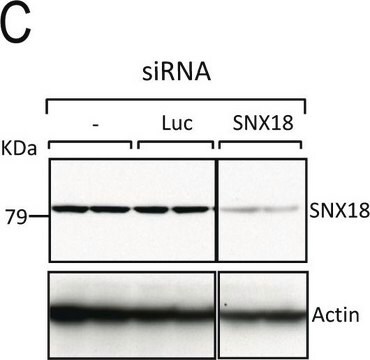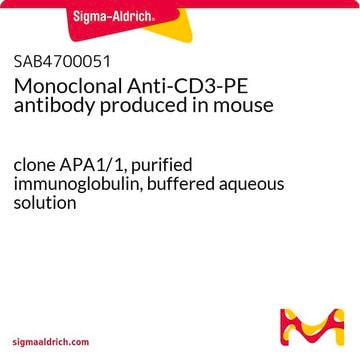SAB4700041
Anti-CD3, low endotoxin antibody, Mouse monoclonal
clone OKT3, purified immunoglobulin, buffered aqueous solution
Synonym(s):
Anti-CD3 Antibody
Sign Into View Organizational & Contract Pricing
All Photos(1)
About This Item
UNSPSC Code:
12352203
NACRES:
NA.41
Recommended Products
biological source
mouse
Quality Level
conjugate
unconjugated
antibody form
purified immunoglobulin
antibody product type
primary antibodies
clone
OKT3, monoclonal
form
buffered aqueous solution
species reactivity
human
concentration
1 mg/mL
technique(s)
flow cytometry: suitable
immunohistochemistry: suitable
isotype
IgG2a
NCBI accession no.
shipped in
wet ice
storage temp.
2-8°C
target post-translational modification
unmodified
Gene Information
human ... CD3(916)
General description
CD3 (cluster of differentiation 3) molecule is encoded by the gene mapped to human chromosome 11q23.3. The encoded protein exists in three isoforms, CD3ε, CD3γ and CD3δ and each contains an N-terminal extracellular domain, a transmembrane segment and a cytoplasmic domain. CD3 is a 20kDa glycoprotein expressed on the surface of all human T lymphocytes.
The mouse monoclonal antibody OKT3 recognizes the CD3 antigen of the TCR/CD3 complex on mature human T cells. This antibody, also known as Orthoclone OKT3 or Muromonab-CD3, has been extensively used as a drug for therapy of acute, glucocorticoid resistant rejection of allogenic renal, heart and liver transplants. It has also been investigated for use in treating T-cell acute lymphoblastic leukemia.
Application
Anti-CD3, low endotoxin antibody, mouse monoclonal has been used to activate Jurkat cells and peripheral blood mononuclear cell (PBMC) to facilitate formation of T helper (Tfh) cells.
The reagent is designed for Flow Cytometry analysis. Suggested working dilution is 1 μg/mL of sample. Indicated dilution is recommended starting point for use of this product. Working concentrations should be determined by the investigator.
Biochem/physiol Actions
T-cell receptor- CD3 (cluster of differentiation 3) complex including CD3ε, CD3γ and CD3δ play a vital role in inducing early metabolic events that lead to T cell activation. Mutation in CD3ε has been observed in T-B+ NK+ severe combined immunodeficiency (SCID) patients.
Features and Benefits
Evaluate our antibodies with complete peace of mind. If the antibody does not perform in your application, we will issue a full credit or replacement antibody. Learn more.
Physical form
Solution in azide free phosphate buffered saline, pH 7.4; 0.2 um filter sterilized. Endotoxin level is less than 0.01 EU/mg of the protein, as determined by the LAL test.
Disclaimer
Unless otherwise stated in our catalog or other company documentation accompanying the product(s), our products are intended for research use only and are not to be used for any other purpose, which includes but is not limited to, unauthorized commercial uses, in vitro diagnostic uses, ex vivo or in vivo therapeutic uses or any type of consumption or application to humans or animals.
Not finding the right product?
Try our Product Selector Tool.
Storage Class Code
12 - Non Combustible Liquids
WGK
nwg
Flash Point(F)
Not applicable
Flash Point(C)
Not applicable
Choose from one of the most recent versions:
Already Own This Product?
Find documentation for the products that you have recently purchased in the Document Library.
Customers Also Viewed
The T cell receptor/CD3 complex: a dynamic protein ensemble.
Clevers H, et al.
Annual Review of Immunology, 6, 629-662 (1988)
The T cell receptor/CD3 complex: a dynamic protein ensemble.
Clevers, H, et al.
Annual Review of Immunology, 6, 629-662 (1988)
Florian Baumgart et al.
Nature methods, 13(8), 661-664 (2016-06-14)
We present a method to robustly discriminate clustered from randomly distributed molecules detected with techniques based on single-molecule localization microscopy, such as PALM and STORM. The approach is based on deliberate variation of labeling density, such as titration of fluorescent
A novel pathogenic frameshift variant of CD3E gene in two T-B+ NK+ SCID patients from Turkey.
Firtina S
Immunogenetics, 69, 653-659 (2017)
Most Jacobsen Syndrome Deletion Breakpoints
Occur Distal to FRA11B
Michaelis RC
American Journal of Medical Genetics, 76, 222-228 (1998)
Our team of scientists has experience in all areas of research including Life Science, Material Science, Chemical Synthesis, Chromatography, Analytical and many others.
Contact Technical Service









